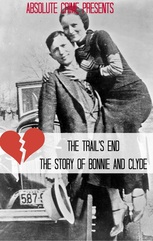The Trail's End: The Story of Bonnie and Clyde

In the world of outlaws, few are as famous as Bonnie and Clyde. Their legend has become a folktale in American history, and their crimes have been exploited as heroic.
The real story of Bonnie and Clyde does not carry the glamour of the Hollywood movies that have helped cement their names in American history while portraying them as victims and idealistic lovers. This is the real story of Bonnie and Crime—the brutal, gripping, page-turning story.
The real story of Bonnie and Clyde does not carry the glamour of the Hollywood movies that have helped cement their names in American history while portraying them as victims and idealistic lovers. This is the real story of Bonnie and Crime—the brutal, gripping, page-turning story.
Buy Now!
The Trail's End PDF and ePub |
Excerpt
Introduction
At the edge of a pond on a north-central Texas farm, a cottonmouth slithered into the water and started gliding furtively across the surface in search of prey. A chorus of birds whistled in the overhanging trees, the branches reflecting in the still water. There among the leafy shadows, the hungry reptile zigzagged along, leaving murky green ripples in its wake.
There were three ponds on this family farm in Tarrant County, and Delbert Coons, the oldest of six kids, tramped through the field toward the pond closest to Norwood Road. One of the family's two workhorses clomped alongside him. Delbert held the lead rope loosely in one hand as he led the horse to the pond for a much needed drink.
He and his siblings often swam in the big pond; in fact, that's where they bathed during the scorching summer months. Like many other families in the early 1930s, the Coons didn't have electricity. During winter, if they wanted warm bath water, they heated it in a big iron caldron outside their farm house on a fire whose flames shot four or five feet into the air. They didn't have a phone either. If they needed one, they drove into Bedford to use the phone at the Fitch Store. Due to the desperate effects of the Great Depression and the decline in wheat farming, a result of the ravaging Dust Bowl, times were hard all the way around. Most folks who dug in—and didn't move to the city in hopes of a better life—struggled to get by. The Coons had it rough, too, but fared better than most rural families.
As Delbert made his way to the pond that day with the horse, he knew to keep his eyes peeled for snakes. When he and his brothers weren't busy with their daily chores, they could be spotted shooting chicken hawks or catching water moccasins unawares; they'd zero in while the snakes sunned themselves on the branches of the willow trees. Then they'd aim their .22 rifles and shoot them dead.
So he was expecting snakes, but he wasn't expecting to happen upon two strangers—a man and a woman—kicking back on the banks of the family's twelve-foot deep pond.
He was curious, so he stopped near enough to converse with the couple, letting the horse lower its muzzle to the cool water. The twosome had spread a blanket under a stand of oak trees where buttercups dotted the grass. Out yonder was a peach orchard as well as pecan and pear trees. It was a lovely place to stop. The teen couldn't really blame them. He glanced over and gave them a nod. The man, clad in a dark single-breasted suit, wouldn't look straight at Delbert, but the woman seemed friendly and she smiled.
“Is it okay if we rest here awhile?” she asked, motioning with a delicate hand. She was a cute woman, young and petite, but she looked a bit travel worn.
Delbert slid his flat newsboy cap back and scratched his head. “No harm in it, I don't reckon,” he said.
To his right, he caught sight of the couple's gleaming Ford Coupe. They had parked off the gravel road, snuggled up close to the bushy bodark trees that lined the road's edges. From there they would have had to climb through a barbed-wire fence before making their way to the pond.
“Well, I better git for home,” Delbert said, as he tugged the lead and pulled the horse's head around. He didn't really give the pair much thought as he turned and led the horse back to the barn.
It wasn't until a few days later when he read a feature in the daily paper with photos of the very couple he'd spoken to that Delbert made the startling connection. The duo parked on their farm that day had been two of the most hunted gangsters in Texas, and now they were wanted for another murder. Their names were Bonnie Parker and Clyde Barrow.
Clyde and his pretty sidekick fronted a small band of outlaws called the Barrow Gang. The dire economic and environmental conditions of the dirty thirties proved to be the ideal breeding ground for the deadly and ill-fated duo.
This little coterie of criminals boldly and haphazardly plied its trade during the time of the big-league gangsters like John Dillinger, Pretty Boy Floyd, and Baby-face Nelson. What set this band of luckless gangsters apart, however, was that a sort of outlaw version of Romeo and Juliet was at the helm. But even Shakespeare couldn't have dreamed up all the crazy, nerve-wracking, and tragic misadventures the lovers would bring upon themselves and those who stood in their way.
Clyde Barrow led the gang, but with his spritely moll—who the public came to perceive as his trigger-happy dame—they captured the imagination of a nation. Other gang members played less prominent roles in the ever-changing saga, including Clyde's older brother, Buck, who had a young wife named Blanche.
During Bonnie and Clyde's two-year plunder across middle-America, they would frighten, shock, disgust, entertain and beguile the masses; their luck would finally spin itself out on a lonesome dirt road in northeastern Louisiana.
At the edge of a pond on a north-central Texas farm, a cottonmouth slithered into the water and started gliding furtively across the surface in search of prey. A chorus of birds whistled in the overhanging trees, the branches reflecting in the still water. There among the leafy shadows, the hungry reptile zigzagged along, leaving murky green ripples in its wake.
There were three ponds on this family farm in Tarrant County, and Delbert Coons, the oldest of six kids, tramped through the field toward the pond closest to Norwood Road. One of the family's two workhorses clomped alongside him. Delbert held the lead rope loosely in one hand as he led the horse to the pond for a much needed drink.
He and his siblings often swam in the big pond; in fact, that's where they bathed during the scorching summer months. Like many other families in the early 1930s, the Coons didn't have electricity. During winter, if they wanted warm bath water, they heated it in a big iron caldron outside their farm house on a fire whose flames shot four or five feet into the air. They didn't have a phone either. If they needed one, they drove into Bedford to use the phone at the Fitch Store. Due to the desperate effects of the Great Depression and the decline in wheat farming, a result of the ravaging Dust Bowl, times were hard all the way around. Most folks who dug in—and didn't move to the city in hopes of a better life—struggled to get by. The Coons had it rough, too, but fared better than most rural families.
As Delbert made his way to the pond that day with the horse, he knew to keep his eyes peeled for snakes. When he and his brothers weren't busy with their daily chores, they could be spotted shooting chicken hawks or catching water moccasins unawares; they'd zero in while the snakes sunned themselves on the branches of the willow trees. Then they'd aim their .22 rifles and shoot them dead.
So he was expecting snakes, but he wasn't expecting to happen upon two strangers—a man and a woman—kicking back on the banks of the family's twelve-foot deep pond.
He was curious, so he stopped near enough to converse with the couple, letting the horse lower its muzzle to the cool water. The twosome had spread a blanket under a stand of oak trees where buttercups dotted the grass. Out yonder was a peach orchard as well as pecan and pear trees. It was a lovely place to stop. The teen couldn't really blame them. He glanced over and gave them a nod. The man, clad in a dark single-breasted suit, wouldn't look straight at Delbert, but the woman seemed friendly and she smiled.
“Is it okay if we rest here awhile?” she asked, motioning with a delicate hand. She was a cute woman, young and petite, but she looked a bit travel worn.
Delbert slid his flat newsboy cap back and scratched his head. “No harm in it, I don't reckon,” he said.
To his right, he caught sight of the couple's gleaming Ford Coupe. They had parked off the gravel road, snuggled up close to the bushy bodark trees that lined the road's edges. From there they would have had to climb through a barbed-wire fence before making their way to the pond.
“Well, I better git for home,” Delbert said, as he tugged the lead and pulled the horse's head around. He didn't really give the pair much thought as he turned and led the horse back to the barn.
It wasn't until a few days later when he read a feature in the daily paper with photos of the very couple he'd spoken to that Delbert made the startling connection. The duo parked on their farm that day had been two of the most hunted gangsters in Texas, and now they were wanted for another murder. Their names were Bonnie Parker and Clyde Barrow.
Clyde and his pretty sidekick fronted a small band of outlaws called the Barrow Gang. The dire economic and environmental conditions of the dirty thirties proved to be the ideal breeding ground for the deadly and ill-fated duo.
This little coterie of criminals boldly and haphazardly plied its trade during the time of the big-league gangsters like John Dillinger, Pretty Boy Floyd, and Baby-face Nelson. What set this band of luckless gangsters apart, however, was that a sort of outlaw version of Romeo and Juliet was at the helm. But even Shakespeare couldn't have dreamed up all the crazy, nerve-wracking, and tragic misadventures the lovers would bring upon themselves and those who stood in their way.
Clyde Barrow led the gang, but with his spritely moll—who the public came to perceive as his trigger-happy dame—they captured the imagination of a nation. Other gang members played less prominent roles in the ever-changing saga, including Clyde's older brother, Buck, who had a young wife named Blanche.
During Bonnie and Clyde's two-year plunder across middle-America, they would frighten, shock, disgust, entertain and beguile the masses; their luck would finally spin itself out on a lonesome dirt road in northeastern Louisiana.








